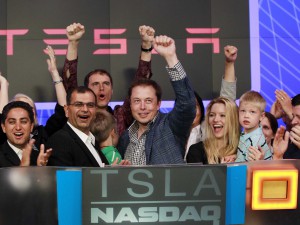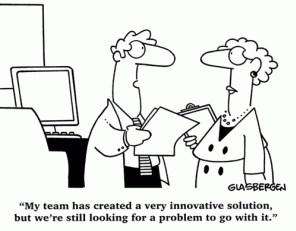Student
Lockheed Martin’s Claims Sustainable Fusion is Within Its Grasp

Lockheed Martin Claims Sustainable Fusion is Within Its Grasp
Skunk Works Reveals Compact Fusion Reactor Details
Lockheed Martin’s New Compact Fusion Reactor Might Change Humanity Forever
In February, Lockheed Martin’s Skunk Works team made a bold announcement: they are 5-10 years away from successfully creating and commercially selling compact fusion reactors (CFRs). These devices are conceptually safer, cleaner, and more powerful than much larger nuclear systems that rely on nuclear fission. CFRs use water for fuel, produce byproducts that are safe, and releases no air pollution. These devices are scalable, so they can be used as the power source for airplanes and space ships, for which they could fly indefinitely. A CFR that is the size of 23 x 42 feet could produce enough energy to power a large cargo ship or an 80,000-home city. If Lockheed Martin can actually make this work, then, as so many people are saying, it will be a revolutionary and transformative step for humanity.
It’s clear that such a device would be a huge disruptive innovation. To create a cheap, portable, more powerful, safe and clean energy source would significantly affect several industries, especially the energy, oil and gas, and environmental industries. I think would be several types of disruptive innovations, including low-end, sustaining, and new-market innovation. This would be a low-end innovation because using a CFR would be cheaper than using, say, oil and gas for your primary energy source. It would also reduce the risk of catastrophic nuclear disasters (think Fukushima). This would be a new-market innovation because, well, a fusion reactor has never been created before. It may be performing the same function as other energy sources, but it will create new industries around it. And it will be a sustaining innovation for the reason mentioned earlier: it’s performing the same function of generating energy.
What do you guys think about these Lockheed Martin’s announcement? Is it as revolutionary as they purport it to be, or is it overhyped? Do you think it would be a major disruptive innovator, or might it lose out to legal opposition from the current energy and oil and gas industries? What other industries do you think would be affected by this technology? Let me know what you think!
Amazon’s Dash Button to Automate Your Orders
Amazon is taking on a initiative to harness the power of the internet of things before the things get to our homes. This reminds me of the the talking point we brought up in class which was that we may not need every appliance in our houses to have a microprocessor, rather a central unit of command that takes input from everything else (smartphone in this case.)
In my opinion, this Dash Button thing is going to fail because it isn’t a seamless integration into people’s life and could be easily substituted by a technology that consumers would own anyways likes smart watches. However, this initiative will enforce the idea that automating time consuming parts of our lives (such as doing groceries) doesn’t have to be a high tech solution.
Presentation Tips

As our presentations draw closer, I did some research on how best to present ideas to the panel of judges who would be considered angel investors.
I found a nice Forbes article by Carmine Gallo with five tips.
1) The pitch should have a compelling story as opposed to only being data-driven as angel investors take on more of a mentor role by providing emotional as well as financial support. 2) He then suggests using pictures to tell the story as they make the presentation more memorable than words. 3) The presenters should be passionate about their product during their pitch. 4) If the product does not solve a problem, investors will likely not care about it. I found this odd as this would usually be the first thing mentioned in many of the other pitch tips I browsed through. He must have assumed a good product was envisioned or else you wouldn’t be pitching the idea. 5) And lastly, share the stage. Since everyone is required to present, this will show a cohesive group where everyone played a part.
Is this advice common knowledge? Do you think these tips will actually help your presentations?
Tesla’s New Venture — Home Batteries?

Tesla CEO Elon Musk tweeted today “Major new Tesla product line — not a car — will be unveiled at our Hawthorne Design Studio on Thurs 8pm, April 30″ and these few simple words have sent the media into a tizzy. What will it be? What does the mad genius have up his sleeve? Apparently, according to many outlets and this article, Musk & Co. are working on a home battery solution that can power all of your home electricity needs for a set period of time–all the while interfacing with SolarCity’s (of which Musk is Chairman) solar solutions to provide “free” electricity in perpetuity. I think it’s a great idea that offers a definitive value proposition. If they can get the launch right, and the cost low, I think it’ll reach many millions of households over the next decade. I think this home solution aims to disrupt the “commodity” status that power delivery companies have fallen into, and I can see this spurring some much needed innovation in the marketplace. What ramifications do you think this will have on power companies and their strategy moving forward? Do you see companies like PECO partnering with Tesla to provide these packs as a supplement rather than a “whole home” solution?
“Why You Should Care About Periscope, Twitter’s New Live-Streaming App”

So after Meerkat Twitter released its own live streaming capabilities. The question now is, is this a fad or the next thing is social media. One of the most interesting things about this article is the move by Twitter to remove Merrket access to it’s social graph. “The move blocked people from bringing their followers and people they were following on Twitter into Meerkat, thereby limiting the app’s ability to grow. Nevertheless, Meerkat announced Thursday that it had raised $14 million in venture capital funding.”Timothy Stenovec 2015) This is a prime example of the moves that incumbents use to try to combat the new competition entering the market.
Here is the article: “Why You Should Care About Periscope, Twitter’s New Live-Streaming App”
Will Apple Disrupt the Luxury Watch Market?
This article talks about how Apple’s new Apple Watch could disrupt various industries, including the fitness wearable and luxury watch industries. Apple’s low-end Apple Watch Sport will likely disrupt the fitness wearable industry, while the higher end Apple Watch and Apple Watch Edition will be more likely be disruptors for the luxury watch industry. Tim Cook is not just looking to create another smartwatch; he sees this as a move for Apple to enter the luxury fashion industry.
It appears that the luxury watch industry does not feel threatened by Apple’s newest device. Sebastian Vivas, director of a watch museum maintained by Swiss watch manufacturer, Audemars Piguet, says “We’re not afraid; we’re just a little bit smiling.”
Is the luxury watch industry underestimating the threat of the Apple Watch? Do you think there are other industries that should also prepare to be disrupted by the Apple Watch?
Unsustainable Business Models: They Skip the “Search” Phase
In this blog post on Strategyzer, Nabila Amarsy outlines the 3 essential requirements to make a business venture successful:
- The Right Value Proposition
- The Right Business Model
- Flawless Execution
This might seem like common sense, but Amarsy goes on to define what she calls the “search” phase of developing a business idea and how its absence lies at the root of many unsuccessful business ventures. The “search” phase takes place in conjunction with the first 2 requirements outlined above, and basically means “producing market evidence that an idea is going to work”. This phase can be viewed as a loop (refer to the picture above) that occurs until enough research, prototyping, and testing has been done to conclude that the idea will work. Skipping the “search” phase is referred to as premature scaling, and Amarsy claims it can kill any business. Flawless execution can then only be successfully achieved after appropriately exiting the “search” phase.
What do you guys think about this? Should Christenson (and others) have included this in his article “Reinventing the Business Model”? Do you think many people just assume their idea is great because they themselves (and maybe a select inner grouping of people) think so? And what of the companies that skip this phase but are still successful (such as large corporations that invest heavily in R&D, which Amarsy points out is not synonymous with “searching”)? Are they just lucky? And how much time should be invested into the “search” phase? Finally, this idea is very appropriate for our capstone project. How many teams think they successfully conducted a “search” phase that enabled them to conclude their idea was worth pursuing?
————————————————————————————————————————————————————
“We’re a classic MBA case study in how not to introduce a product. First we created a marvelous technological achievement. Then we asked how to make money on it.”
–Iridium Interim CEO John A. Richardson, August 1999
Top 5 Risks for IT Projects
I found this article where the author lists what he believes to be the top 5 risks for IT projects. They are as follows:
1. Other projects getting prioritized over yours, thus taking funding away.
2. Project delays due to infrastructure/system upgrades.
3. Requirement changes/ updates to scope that mean additional work.
4. Project dates can be pushed due to an impact analysis that reveals additional issues/work to be done.
5. Coding can take longer than expected, as initial estimates may be wrong.
The author also mentions how critical it is to identify risks versus organizational issues. For instance, a lack of capabilities on the organizations part may lead to risks, though they are not risks themselves.
Do you think his list covers everything or are there more project risks that he hasn’t mentioned? Which risk would you say is the greatest?
The Five Marketing Must-Haves of an Online Startup

In our first meeting with our mentor, he expressed serious concerns regarding our marketing strategy. This was because we didn’t have one. Each of us may have had some sense of how we wanted to market the application, but there wasn’t a clear direction.
This Entrepreneur article provides five marketing tips for a startup.
1. Focus on customer experience
This means designing a simple application that is easy to use. No matter how good an application is, if people have difficulty using it, they won’t.
2. Cross promotions/exposure
Know your target demographic. Where do they usually hang out (online or offline)? Promote your products at these places.
3. Content strategies
“Establish your brand as a subject-matter expert.”
4. Build virality into your product/experience
How can you get people to share your startup naturally?
5. Media exposure
If you can’t get top-tier media exposure, getting blogs to write about you is a good start.
This is in no way a comprehensive list. Do you agree or disagree with these points? Are there tips that you would consider more valuable than the ones listed above?
Performance Reviews: Self-Evaluation?

In this Forbes article, the author lists the 10 biggest mistakes bosses make in performance reviews. Instead of re-listing all of them here, I’ll allow everyone to read the article for themselves. Upon review of the article, and judging by other posts on this blog about performance reviews, I think we can all agree that there is a lot of frustration out there in the corporate world and flaws being made in regards to performance reviews. There are a lot of opinions on what constitutes a good or bad review, or a good assessment system, but all of this controversy got me thinking: why don’t employees just evaluate themselves?
Instead of having a boss review your performance over the last quarter/year/whenever and trusting they are aware of all you have contributed, what do you guys think about employees assessing themselves and pointing out how they have benefited the company in the context of their specific role and what is expected of them, but also pointing out areas for improvement? Obviously an employee is not going to want to give themselves a bad review, so maybe there could be a hybrid system where an employee strictly points out a list of contributions that a supervisor/boss may have forgotten about or overlooked, and leave the negatives to the supervisor.
This is just a thought, but one I have not heard of or come across in our discussion of this topic in our class. Do you guys think this could be a viable alternative? Have any of you heard of this before in the real world? If so, has it worked? Is it successful? Would this work in our class, or would that be a bad idea?





